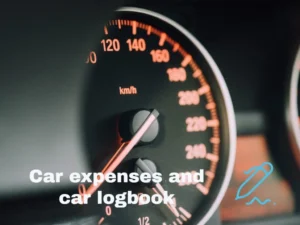You must only claim motor vehicle expenses relating to work travel and we recommend a logbook will substantiate your claim. To substantiate car expenses the ATO requires that you keep a car logbook or use the 20% statutory method. The car logbook is used to justify your motor vehicle claim.
Types of expenses Common types of motor vehicle expenses you can claim include:
- fuel
- repairs and servicing
- interest on HP,
- lease payments,
- insurances or VIC roads registration
- and depreciation of your vehicle
Per ATO here is what you must do for the operating or logbook method
Logbook method You can claim the business-use percentage of each car expense, based on logbook records. You must record:
- When the logbook period begins and ends
- The car’s odometer reading at the start and end of the logbook period
- Details of each journey including start date and finishing date. I.e odometer readings at the start and end, kilometres travelled, and reason for the journey.
You must keep the logbook for a period (at least 12 continuous weeks) . This must be a normal representative of your travel throughout the year.
You can then use this representative period to calculate your claim for five years if no change in use .
The Statutory Method
The other method is the Statutory method. The statutory method for car benefit FBT calculations is used when the operating cost method is not selected. Or if a car logbook hasn’t been kept . The other reason is if the formula provides a more favourable result.
The FBT benefit value is determined by multiplying the car’s cost by 20%. Then apportioning the amount for days of private use.
The Statutory Formula method applies a statutory fraction, currently, 20% regardless of kilometres travelled. Applied to the base value of a car to determine the FBT-taxable value of the car benefit.
Therefore you need to do a logbook. If you, don’t you may find in an ATO review or Audit they may not accept your motor vehicle claim a
Business % of expenses is claimed based on your logbook records once you keep it for 12 weeks. You don’t need to do it beyond this or do another logbook until your travel circumstances change. By change, this means your use of the vehicle changes from the previous usage. i.e you are no longer required to do lots of business travel
Don’t forget you can also only claim the business usage of the GST as well and must adjust for private %
What can I claim for my car expenses
So as a small business what can I claim?
- Your car is used for business trips to visit customers pick up supplies and other business activities such as business travel etc document in your car logbook.
- I work from home can I claim my car 100% – no you need to still justify your travel and ensure your home is your real base to start the travel
- I drive to work and then take the company car so its 100% usage. Providing the logbook states that and its garaged at work then it may be claimable 100%
- I drive to and from my place of business – this is considered private and not claimable
- I pick up the mail around the corner after this is the rest of the trip to my business claimable – no there is a famous case about this.
Commercial vans and Utes above one tonne generally don’t need to have a logbook but check with us. However, say you are a hairdresser and buy a one-tonne pickup, will this exempt me from the logbook requirements? Probably not as the car isn’t being used for the purposes of trade but rather for you to get to the salon
If you have a sedan and need to carry heavy tools you can sometimes justify a greater business use from home to work
Car in a Trust or Company
So my Trust or Company provides me with a car to use who pays the FBT
In this case, you must work out a private usage of the car and declare this as a contribution by the Trust. This offsets the private usage and ensures the Trust only claims the business usage
I am in a Company with joint shareholders. The Company pays my petrol can I claim the car expenses in my own name? Again as a shareholder, you need to either reimburse the Company or the Company needs to pay FBT. You can offset the petrol costs against the employee FB contribution.
If you are reimbursed for car expenses the expenses cannot be claimed again.
It pays to keep a logbook and determine the right business usage and thereby ensuring you can claim the right amount for tax and keep the taxman happy.


